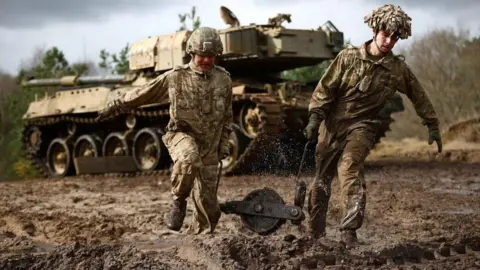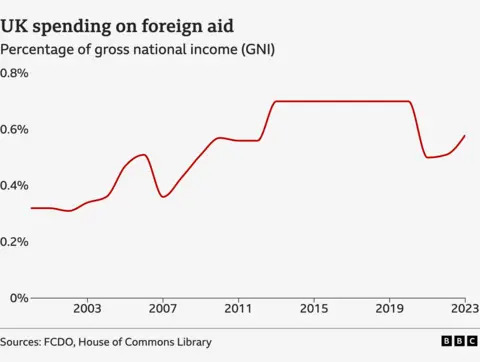Political reporter
Defence correspondent
 Getty Images
Getty ImagesPrime Minister Sir Keir Starmer has set out plans to increase defence spending to 2.5% of national income by 2027, as peace talks to end the war in Ukraine gather pace.
The PM said he would cut the UK’s international aid budget to fund the rise in defence spending, which is currently 2.3% of GDP.
Opposition parties welcomed the move to spend more on defence but the aid cuts were branded “a betrayal” by charities.
The announcement comes ahead of a meeting between Sir Keir and US President Donald Trump at the White House on Thursday.
President Trump has been urging European countries to spend more on defence, as global powers attempt to broker a deal to end the war in Ukraine.
The move was praised by US Defence Secretary Pete Hegseth, who called it a “strong step from an enduring partner”.
Sir Keir said the UK’s aid budget would be reduced from 0.5% of GDP to 0.3% in 2027, “fully funding the investment in defence”.
He told the Commons that would mean spending £13.4bn more on defence every year from 2027.
Last year the UK spent £53.9bn on defence.
The prime minister said defence spending would rise to 2.6% of GDP by 2027, once the contribution of intelligence services to defence had been factored in.
Urging European allies to step up, Sir Keir said the UK would also set out a “clear ambition” to increase defence spending to 3% of GDP after the next general election.
He said the boost in defence spending could only be funded through “extremely difficult and painful choices”, adding the aid cut was not “an announcement I am happy to make”.
However, he added that “the defence and security of the British people must always come first”.
In its election manifesto, Labour pledged to restore development spending to 0.6% of gross national income “as soon as fiscal circumstances allow” – a goal the government says it is still committed to.
Charities were stunned by the aid cut, with Save the Children calling it “a betrayal of the world’s most vulnerable children and the UK’s national interest”.
“There is nothing respectful about slashing lifelines for families in the most dangerous places,” the charity’s chief executive Moazzam Malik said.
Labour MP Sarah Champion, who chairs the Commons International Development Committee, called on the government to “rethink today’s announcement”.
“Cutting the aid budget to fund defence spending is a false economy that will only make the world less safe,” she said.

The hike in defence spending will help the UK’s armed forces, which have experienced severe cuts since the end of the Cold War.
However, it will not completely reverse the decline in the country’s military capability.
Even before this extra cash injection, the Ministry of Defence was facing a black hole in its equipment budget of around £17bn over the next decade, according to the National Audit Office.
A large part of the increase will go towards plugging holes in underfunded programs and fixing urgent shortages in munitions, according to Malcolm Chalmers, deputy director of the Royal United Services Institute think tank.
But he said the commitment to reach 3% of GDP by the mid-2030s could lead to a “transformation in how our military fights”, giving the armed forces the ability to plan long-term and “ensuring that innovation is not always squeezed out by spending on big platforms”.
Sir Keir had previously said the government would set out a pathway to spending 2.5% of GDP on the military by the next general election, following a review of the country’s defence capabilities.
But rapid diplomatic developments, spurred by President Trump’s push to end the war in Ukraine, injected urgency into decisions about defence.
It is unclear if the increase will impress Trump, who has been telling European Nato allies they should be spending something more like 5% on defence.
Nato guidelines suggest each member state should spend at least 2% of their GDP, but recently the organisation’s head, Mark Rutte, said allies should be aiming for something “north of 3%”.
The prime minister’s trip to the White House later this week follows French President Emmanuel Macron’s talks with Trump on Monday.
It is a high-stakes visit as European leaders scramble to put forward their own proposals for ending the war and keeping Russia at bay.
Ahead of the meeting, Sir Keir said: “We must reject any false choice between our allies, between one side of the Atlantic and the other.”
Conservative leader Kemi Badenoch welcomed the increase in defence spending and the “repurposing” of money from the aid budget.
But she did question whether the government had a strong enough economic strategy to underpin the rise in spending on defence.
The Liberal Democrats have previously called for cross-party talks on reaching 3% of GDP on defence “as soon as possible”.
Party leader Sir Ed Davey welcomed the announcement but urged the government to “raise the money in different ways” through seizing frozen Russian assets or by increasing taxes on multi-national tech companies.
The SNP’s Westminster leader, Stephen Flynn, said that whilst his party backed the increase in defence spending, it could not support “the populist playbook” of cutting aid to fund it.



